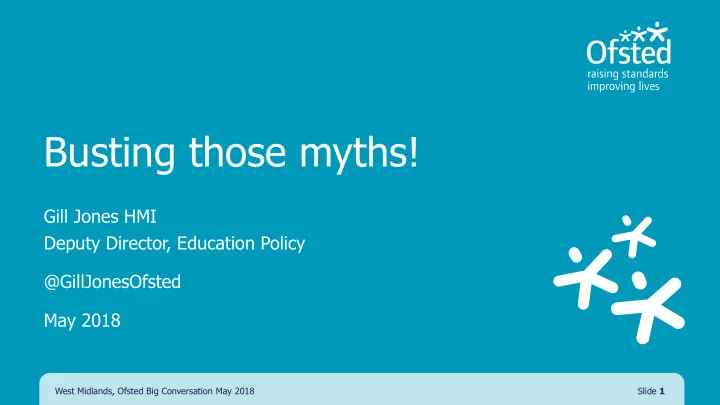

Busting those myths! Gill Jones HMI Deputy Director, Education Policy @GillJonesOfsted May 2018 West Midlands, Ofsted Big Conversation May 2018 Slide 1
https://www.gov.uk/government/publications/inspecting- registered-early-years-providers-guidance-for-inspectors West Midlands, Ofsted Big Conversation May 2018 Slide 2
Bold beginnings West Midlands, Ofsted Big Conversation May 2018 Slide 3
Bold beginnings In November 2017, we published a thematic survey report about the Reception curriculum in good and outstanding schools. This report is one part of Ofsted’s ongoing work around the intention, implementation and impact of the curriculum in England. Bold beginnings, Autumn 2017 Slide 1 West Midlands, Ofsted Big Conversation May 2018 Slide 4
EY thematic surveys 2014 – 2016 West Midlands, Ofsted Big Conversation May 2018 Slide 5
West Midlands, Ofsted Big Conversation May 2018 Slide 6
Why a specific focus on Reception? West Midlands, Ofsted Big Conversation May 2018 Slide 7
West Midlands, Ofsted Big Conversation May 2018 Slide 8
West Midlands, Ofsted Big Conversation May 2018 Slide 9
West Midlands, Ofsted Big Conversation May 2018 Slide 10
West Midlands, Ofsted Big Conversation May 2018 Slide 11
West Midlands, Ofsted Big Conversation May 2018 Slide 12
West Midlands, Ofsted Big Conversation May 2018 Slide 13
Leadership – the golden thread Headteachers in the schools visited gave just as much attention to the Reception Year as they did to key stages 1 and 2. They simply did not accept that children would, ‘catch - up later’. They recognised that children needed to be physically, socially and emotionally ready for Year 1, but that it was also vital that they were well-prepared in reading, writing and mathematics. The roles and responsibilities of subject leaders started in Reception and not in Year 1. For visited felt that the EYFS framework did not differentiate sufficiently well between the different ages of children and the different types of settings they attended. Guidance for the Reception Year, specifically, was considered weak. West Midlands, Ofsted Big Conversation May 2018 Slide 14
The Curriculum There is no clear curriculum for Reception. The lines between curriculum, teaching and assessment are blurred. Few schools recognised their wider provision as being part of their curriculum: snack times, story time, use of the hall. Reading was at the heart of the Reception curriculum. Leaders and staff were less confident about teaching early mathematics and found the progression to Y1 most difficult in this area of learning. Leaders also recognised the importance of resilience, perseverance, concentration, the ability to listen, to take turns and to cooperate. West Midlands, Ofsted Big Conversation May 2018 Slide 15
West Midlands, Ofsted Big Conversation May 2018 Slide 16
West Midlands, Ofsted Big Conversation May 2018 Slide 17
West Midlands, Ofsted Big Conversation May 2018 Slide 18
West Midlands, Ofsted Big Conversation May 2018 Slide 19
West Midlands, Ofsted Big Conversation May 2018 Slide 20
Assessment Staff told us that assessment of 17 separate early learning goals (ELGs) was excessive and time-consuming. They supplemented their observations with other assessments, where this was the most efficient way of recording a child’s success. Leaders were clear that more time should be spent teaching, directly interacting with children, than capturing children’s strengths and weaknesses i.e. photographs In some schools, the EYFSP was only used as an end-of-year benchmarking tool; it was not used for continuous assessment throughout the year. West Midlands, Ofsted Big Conversation May 2018 Slide 21
Four guiding principles should shape practice in early years settings every child is a unique child, who is constantly learning and can be resilient, capable, confident and self-assured; children learn to be strong and independent through positive relationships; children learn and develop well in enabling environments, in which their experiences respond to their individual needs and there is a strong partnership between practitioners and parents and/or carers; and children develop and learn in different ways and at different rates. The framework covers the education and care of all children in early years provision, including children with special educational needs and disabilities. West Midlands, Ofsted Big Conversation May 2018 Slide 22
Three characteristics of effective teaching and learning are: Playing and exploring – children investigate and experience things – ‘have a go’ Active learning - children concentrate and keep on trying if they encounter difficulties, and enjoy achievements; and creating and thinking critically - children have and develop their own ideas, make links between ideas, and develop strategies for doing things. West Midlands, Ofsted Big Conversation May 2018 Slide 23
https://educationendowmentfoundation.org.uk/evidence-summaries/early-years-toolkit West Midlands, Ofsted Big Conversation May 2018 Slide 24
West Midlands, Ofsted Big Conversation May 2018 Slide 25
Ofsted on the web and on social media www.gov.uk/ofsted http://reports.ofsted.gov.uk www.linkedin.com/company/ofsted www.youtube.com/ofstednews www.slideshare.net/ofstednews www.twitter.com/ofstednews West Midlands, Ofsted Big Conversation May 2018 Slide 26
Recommend
More recommend